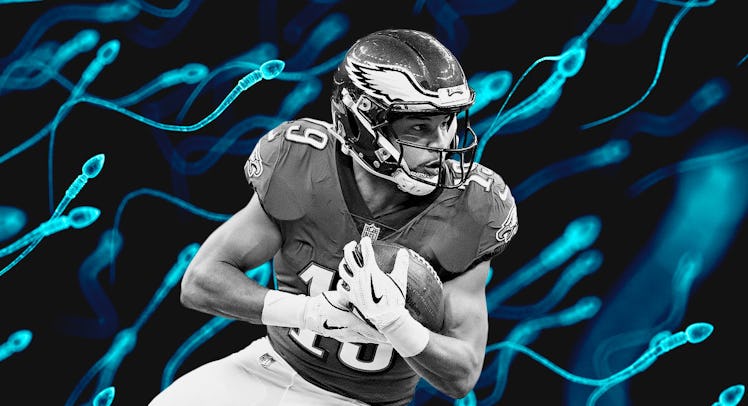Golden Tate Claims Fertility Treatments Lead to Suspension. Wait, Really?
Fertility treatments are part of the NFL's banned substances. Don't expect them to get you jacked.

Golden Tate, the New York Giants wide receiver, insists he is not using steroids — he’s just not as fertile as he used to be. Tate claims a ferrtility specialist prescribed him medication on the NFL’s list of banned performance enhancing drugs, but he did not realize this until after he started taking it. He discontinued the medication and disclosed the issue to the league, but it was too late. He now faces a four-game suspension for trying to have a third kid in the offseason and the loss of $1.75 million in income if his appeal is denied.
Family planning sure is expensive.
Just how did drugs that help a man’s sperm get back in action get on the NFL banned drug list? It all has to do with the NFL’s paranoia around any substance that has anything whatsoever to do with the big ‘T’ — testosterone.
Testosterone is essential for male fertility. Without testosterone, which is naturally produced by the pituitary gland, the process of spermatogenesis would stop very early on and sperm simply could not exist. Testosterone levels naturally decline with age, sleep loss, weight gain, and other lifestyle factors. In the past, this has been difficult to treat, especially for fathers who want to have more children. But advances in medicine allow men who are struggling to have kids, like Golden Tate, to get the small boost they need in order to conceive.
Although Tate did not disclose which fertility medication he was taking, Dr. Jamin Brahmbhatt, a urologist (who does not treat the athlete) suspects he was likely prescribed common off-label fertility medications such as clomiphene or anastrozole. While these drugs may not be approved for male infertility specifically, they have become an increasingly popular solution for poor sperm health that’s a result of lower testosterone. Unlike testosterone replacement therapy or anabolic steroids, which halt sperm production completely, these medications stimulate testosterone production. “This is probably why they raise red flags in the professional sports world,” Brahmbhatt tells Fatherly.
Producing more testosterone, of course, means there’s a potential for athletic advantage: Side effects of clomiphene and anastrozole include increased stamina, muscle mass, and performance. How much of an increase? Certainly not enough to warrant a ban for an NFL player. “The increase in numbers is only a small percentage of what the increase can be if actual testosterone was taken,” Brahmbhatt says. “Therefore I feel the performance improvement would be, if anything, minimal.”
There are existing legal avenues around the ban — and this is where Tate gets into trouble. Professional athletes can work with their doctors and leagues to get a pass before taking the medicine. Brahmbhatt recently completed this lengthy process with a professional athlete outside of the NFL to get an exemption from the World Doping Agency (the U.S. Doping Agency also offers exemptions for fertility treatment). “If he went to a legitimate doctor, went through the legitimate hoops, he could get the OK,” Brahmbhatt says, noting that this is an unlikely loophole for athletes to exploit. “It honestly would be hard for every athlete to claim infertility since it’s rare in the first place.” Since Tate seems to have been unaware of the ban, he took no such action
Which all leads to the big question: Why are these substances banned in the first place? If the impacts of fertility drugs on an athlete’s testosterone are so negligible, why create barriers between an athlete and their reproductive health? It’s a question fans, fathers, and would-be dads should be asking the NFL right now.
This article was originally published on